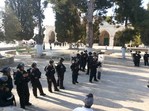27 july 2015
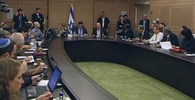
On Monday morning, the Israeli Ministerial Committee drafted an “anti-terrorism” law.
According to Israeli Channel 7, the committee is expected to approve the bill, which amends and expands the definition of “terrorist organizations”, and stresses that sanctions must be imposed on members of so-called organizations and perpetrators of “terrorist” attacks.
Under this bill, any members of organizations which fulfill the infrastructure necessary to be considered a “terrorist” organization will be sentenced to 25 years imprisonment, said the PNN. A member who holds a senior position in the organization could be sentenced to 15 years in prison.
Furthermore, according to the bill, any person who offers technical support, broadcast services or money laundering to the organization can be convicted. Furthermore, the bill prevents any judicial changes and reductions to the convicted sentence of 15 years or more.
According to Israeli Channel 7, the committee is expected to approve the bill, which amends and expands the definition of “terrorist organizations”, and stresses that sanctions must be imposed on members of so-called organizations and perpetrators of “terrorist” attacks.
Under this bill, any members of organizations which fulfill the infrastructure necessary to be considered a “terrorist” organization will be sentenced to 25 years imprisonment, said the PNN. A member who holds a senior position in the organization could be sentenced to 15 years in prison.
Furthermore, according to the bill, any person who offers technical support, broadcast services or money laundering to the organization can be convicted. Furthermore, the bill prevents any judicial changes and reductions to the convicted sentence of 15 years or more.
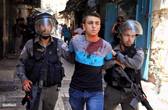
Right-wing Israelis broke into the Al-Aqsa Mosque compound again on Monday, as the UN expressed concerns over "religious provocation" in and around holy sites in the Old City of occupied East Jerusalem.
Witnesses said that 70 right-wing Jews entered the compound via the Moroccan Gate under Israeli police escort.
Israeli police reportedly assaulted and detained a Palestinian worshiper, Ahmad Asaliyyeh, from the compound, and detained a Palestinian woman as she was leaving the compound.
An Israeli police spokesperson could not be reached for comment, according to Ma'an.
The incident came a day after Palestinian worshipers clashed with Israeli police and soldiers across the compound and inside the Al-Aqsa Mosque itself, leaving 19 Palestinians and four Israeli police injured.
The UN Special Coordinator for the Middle East Peace Process, Nickolay Mladenov, issued a statement on Monday to express concern over "recent incidents and heightened tensions" in and around Jerusalem's holy sites, and to "call upon people on all sides to maintain calm."
He said: "Provocative actions and language carry the seed of violence and ultimately undermine the ability of worshipers of all faiths to have access to their respective Holy Sites. Respect for the status quo is in the interest of all and is essential for stability."
The UN representative called on religious and political leaders to "prevent extremist elements from abusing the sanctity of Holy Sites and the different religious sentiments of all people."
Bans, arrests
Israeli forces reportedly detained eight Palestinians from the Al-Aqsa Mosque compound on Sunday, and an Israeli court on Monday banned four Palestinians from entering the compound for periods of up to 60 days. Dania Eid and Alaa Bashi, both Palestinians with Israeli citizenship, were banned from the site for 60 days, while two Palestinians from the West Bank, Akram Daana and a young man identified only as Fadi, were given bans of 30 and 45 days.
Right-wing Israelis were visiting the compound on Sunday to mark Tisha B'Av, an annual Jewish fast day that commemorates the destruction of the First and Second Jewish Temples.
The third holiest site in Islam, the Al-Aqsa Mosque compound is also venerated as Judaism's most holy place as it sits where Jews believe the Temples once stood.
Following Israel's occupation of East Jerusalem in 1967, Israel has maintained an agreement with the Islamic Endowment that controls the compound not to allow non-Muslim prayer in the area.
Jewish prayer is allowed at the neighboring Western Wall, which is the last remnant of the Second Temple. The mosque compound has seen rising tensions in recent days, with Jewish organizations calling for the compound to be open to Jews for the week following Tisha B'Av and others seeking to celebrate unconfirmed reports that Israel is negotiating the reopening of the compound to non-Muslim worship.
At the end of June, International Crisis Group reported discussions between Israel and the Islamic Endowment on allowing non-Muslim worship at the site, although the move has not yet been confirmed.
Witnesses said that 70 right-wing Jews entered the compound via the Moroccan Gate under Israeli police escort.
Israeli police reportedly assaulted and detained a Palestinian worshiper, Ahmad Asaliyyeh, from the compound, and detained a Palestinian woman as she was leaving the compound.
An Israeli police spokesperson could not be reached for comment, according to Ma'an.
The incident came a day after Palestinian worshipers clashed with Israeli police and soldiers across the compound and inside the Al-Aqsa Mosque itself, leaving 19 Palestinians and four Israeli police injured.
The UN Special Coordinator for the Middle East Peace Process, Nickolay Mladenov, issued a statement on Monday to express concern over "recent incidents and heightened tensions" in and around Jerusalem's holy sites, and to "call upon people on all sides to maintain calm."
He said: "Provocative actions and language carry the seed of violence and ultimately undermine the ability of worshipers of all faiths to have access to their respective Holy Sites. Respect for the status quo is in the interest of all and is essential for stability."
The UN representative called on religious and political leaders to "prevent extremist elements from abusing the sanctity of Holy Sites and the different religious sentiments of all people."
Bans, arrests
Israeli forces reportedly detained eight Palestinians from the Al-Aqsa Mosque compound on Sunday, and an Israeli court on Monday banned four Palestinians from entering the compound for periods of up to 60 days. Dania Eid and Alaa Bashi, both Palestinians with Israeli citizenship, were banned from the site for 60 days, while two Palestinians from the West Bank, Akram Daana and a young man identified only as Fadi, were given bans of 30 and 45 days.
Right-wing Israelis were visiting the compound on Sunday to mark Tisha B'Av, an annual Jewish fast day that commemorates the destruction of the First and Second Jewish Temples.
The third holiest site in Islam, the Al-Aqsa Mosque compound is also venerated as Judaism's most holy place as it sits where Jews believe the Temples once stood.
Following Israel's occupation of East Jerusalem in 1967, Israel has maintained an agreement with the Islamic Endowment that controls the compound not to allow non-Muslim prayer in the area.
Jewish prayer is allowed at the neighboring Western Wall, which is the last remnant of the Second Temple. The mosque compound has seen rising tensions in recent days, with Jewish organizations calling for the compound to be open to Jews for the week following Tisha B'Av and others seeking to celebrate unconfirmed reports that Israel is negotiating the reopening of the compound to non-Muslim worship.
At the end of June, International Crisis Group reported discussions between Israel and the Islamic Endowment on allowing non-Muslim worship at the site, although the move has not yet been confirmed.
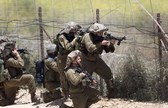
The Israeli Occupation Forces (IOF) carried out Monday morning a limited incursion into the east of Gaza city, Quds Press reported.
Five Israeli military vehicles moved from Nahal Oz military site into Shujaiya neighborhood amid heavy shooting at Palestinian farmers in the area, the sources added.
No casualties were reported during the attack.
Meanwhile, Israeli Navy forces opened fire at Palestinian fishing boats while sailing off the Gaza coast on Monday morning.
The fishing boats were forced to go back to shore after the Israeli attack. No injuries were suffered.
The incident is the latest in the series of Israeli violations of the ceasefire reached between Israel and Palestinian resistance under Egyptian mediation on August 26, 2014.
Five Israeli military vehicles moved from Nahal Oz military site into Shujaiya neighborhood amid heavy shooting at Palestinian farmers in the area, the sources added.
No casualties were reported during the attack.
Meanwhile, Israeli Navy forces opened fire at Palestinian fishing boats while sailing off the Gaza coast on Monday morning.
The fishing boats were forced to go back to shore after the Israeli attack. No injuries were suffered.
The incident is the latest in the series of Israeli violations of the ceasefire reached between Israel and Palestinian resistance under Egyptian mediation on August 26, 2014.

Israeli soldiers kidnapped, earlier on Monday, four Palestinians in the southern West Bank district of Hebron, and installed several roadblocks, and kidnapped a child on Sunday evening. Israeli military sources said soldiers shot a young man, allegedly, after he attempted to stab a soldier.
The WAFA Palestinian News Agency has reported that the soldiers invaded Surif town, northwest of Hebron, kidnapped Omar Abdul-Rahma Eghneimat, 55, and confiscated his agricultural tractor.
In addition, several military vehicles invaded a number of neighborhoods in Hebron city, stormed and searched homes, and kidnapped three Palestinians identified as Baha’ Akram Abu Shkheidem, 22, Rami Mohammad al-‘Oweiwy, 30, and Yousef Hamdi Joneidi, 35 years of age.
Soldiers also installed several roadblocks on Hebron’s northern entrances, and the main entrance of Sa’ir town, northeast of Hebron, before stopping and searching dozens of cars, and investigated the ID cards of the passengers.
Furthermore, soldiers stationed at a military roadblock, east of Hebron, shot and injured a young man, reportedly after he attempted to stab a soldier.
On Sunday evening, soldiers assaulted a child, and took him to the Karmie Tzur illegal settlement, built on Palestinian lands, in Beit Ummar town, north of Hebron.
Mohammad Ayyad Awad, coordinator of the Popular Committee against the Wall and Settlements in Beit Ummar, said the soldiers beat Hamza Abu Hashem, 16 years of age, and kidnapped him.
IOF severely assault Palestinian, claim he tried to stab soldier
A Palestinian youth on Sunday evening suffered moderate wounds after Israeli Occupation Forces (IOF) assaulted him near a military checkpoint east of Hebron.
They claimed that the youth, still unidentified, was assaulted for carrying a knife and intending to attack a soldier near Giv’at Avot settlement near Hebron, before IOF opened fire on him.
Israeli media said that the guy was arrested and moved from the spot by an Israeli ambulance. The soldier did sustain any injuries.
The WAFA Palestinian News Agency has reported that the soldiers invaded Surif town, northwest of Hebron, kidnapped Omar Abdul-Rahma Eghneimat, 55, and confiscated his agricultural tractor.
In addition, several military vehicles invaded a number of neighborhoods in Hebron city, stormed and searched homes, and kidnapped three Palestinians identified as Baha’ Akram Abu Shkheidem, 22, Rami Mohammad al-‘Oweiwy, 30, and Yousef Hamdi Joneidi, 35 years of age.
Soldiers also installed several roadblocks on Hebron’s northern entrances, and the main entrance of Sa’ir town, northeast of Hebron, before stopping and searching dozens of cars, and investigated the ID cards of the passengers.
Furthermore, soldiers stationed at a military roadblock, east of Hebron, shot and injured a young man, reportedly after he attempted to stab a soldier.
On Sunday evening, soldiers assaulted a child, and took him to the Karmie Tzur illegal settlement, built on Palestinian lands, in Beit Ummar town, north of Hebron.
Mohammad Ayyad Awad, coordinator of the Popular Committee against the Wall and Settlements in Beit Ummar, said the soldiers beat Hamza Abu Hashem, 16 years of age, and kidnapped him.
IOF severely assault Palestinian, claim he tried to stab soldier
A Palestinian youth on Sunday evening suffered moderate wounds after Israeli Occupation Forces (IOF) assaulted him near a military checkpoint east of Hebron.
They claimed that the youth, still unidentified, was assaulted for carrying a knife and intending to attack a soldier near Giv’at Avot settlement near Hebron, before IOF opened fire on him.
Israeli media said that the guy was arrested and moved from the spot by an Israeli ambulance. The soldier did sustain any injuries.
26 july 2015
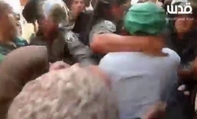
Israeli soldiers kidnapped, earlier on Sunday, two Palestinians in Husan town, west of Bethlehem, and one near the Al-Aqsa Mosque in occupied Jerusalem. Clashes have also been reported when soldiers invaded Silwad town, near Ramallah.
Media sources in Bethlehem have reported that a number of armored Israeli jeeps invaded Husan, west of the city, broke into and violently searched several homes, and kidnapped two young Palestinian men.
The two have been identified as Ahmad Jamal Hamamra, 18, and Ehsan Mousa Hamamra, 19 years of age.
In occupied Jerusalem, soldiers assaulted many Palestinians near the Chain Gate of the Al-Aqsa Mosque compound, and kidnapped a young Palestinian identified as Tamer Shala’ta.
In addition, soldiers invaded Silwad town, east of Ramallah, and clashed with local youths.
The army fired rounds of live ammunition, gas bombs, flares and concussion grenades, while local youths hurled stones and empty bottles on them.
The soldiers also handed ‘Amro Ahmad Hamed, 30, a military order for interrogation in the Etzion military and security base, south of Bethlehem.
Media sources in Bethlehem have reported that a number of armored Israeli jeeps invaded Husan, west of the city, broke into and violently searched several homes, and kidnapped two young Palestinian men.
The two have been identified as Ahmad Jamal Hamamra, 18, and Ehsan Mousa Hamamra, 19 years of age.
In occupied Jerusalem, soldiers assaulted many Palestinians near the Chain Gate of the Al-Aqsa Mosque compound, and kidnapped a young Palestinian identified as Tamer Shala’ta.
In addition, soldiers invaded Silwad town, east of Ramallah, and clashed with local youths.
The army fired rounds of live ammunition, gas bombs, flares and concussion grenades, while local youths hurled stones and empty bottles on them.
The soldiers also handed ‘Amro Ahmad Hamed, 30, a military order for interrogation in the Etzion military and security base, south of Bethlehem.
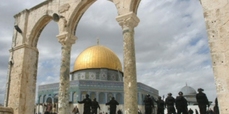
Jewish settlers, on Saturday, severely assaulted a Palestinian child near one of the gates leading to Al-Aqsa Mosque compound, in the Old City of Jerusalem.
Witnesses at the scene reported that extremist Israeli settlers assaulted the child, who was not identified, near al-Ghawanma Gate, prompting a group of Palestinians to intervene and save him. Settlers eventually managed to flee the scene.
This came as Jewish settlers performed Talmudic rituals in front of King Faisal Gate and al-Qattanin Gate, urging large numbers of Palestinian Muslims from the Old City to gather in the area before being dispersed by Israeli police.
The performance of these rituals by Jewish settlers came following calls made by right-wing Jewish organizations, which urged settlers to storm the holy site to mark the ‘destruction of the Temple’.
WAFA Palestinian News & Info Agency reports that Jewish settler groups, known as ‘Temple Mount’ organizations, recently urged all Jewish settlers to storm the holy site to mark Tisha B’Av Day, a Jewish holiday commemorating the ‘destruction of the temple’.
Tisha B’Av, which means “the ninth of the month of Av’, commences on Saturday, July 25 and ends on Sunday 26. This day is marked by fasting and mourning by Jews to commemorate what they believe was the destruction of the temples that stood in the place of the Al-Aqsa Mosque. They also pray on this day for the rebuilding of the ‘temple’ in this spot.
These organizations have presented an appeal signed by 1,000 Israelis to both Israeli Prime Minister Benjamin Netanyahu, demanding that Al-Aqsa Mosque be open for Jews via the Moroccan Gate round the clock starting Sunday 26 July until the end of the week.
The organizations reportedly demanded that Al-Aqsa be entirely closed to Muslims starting Saturday evening and all day Sunday. They also requested the holy site to be closed to Muslims during proposed provocative Israeli visit hours from 7:30 to 11:30 a.m. from Monday to Thursday next week.
The organizations also demanded that Jews entering the mosque’s compound on Sunday would be allowed to pray freely inside, and that groups entering the compound from Monday to Thursday would be allowed to enter the Qabali and Marwani mosques inside of the Al-Aqsa compound.
According to a 1967 agreement the Israeli authorities made after occupying Jerusalem, only Muslim Palestinians are allowed in the Al-Aqsa Mosque compound while Jewish prayer is allowed at the Western Wall next door.
However, in recent months the right-wing Jewish groups who have previously called for the destruction of the Mosque and the construction of a Jewish temple on the site have repeatedly entered the area under heavy police escort.
The visits, combined with proposals for a Knesset vote to divide the site between Jews and Muslims, have outraged the Palestinian public, which sees the encroachment on Al-Aqsa as symptomatic of the wider denial of their rights in historic Palestine as well as intense discrimination in housing, employment, and social services by Israeli authorities.
The compound, which sits just above the Western Wall plaza, houses both the Dome of the Rock and Al-Aqsa Mosque and is the third holiest site in Islam.
It is also venerated as Judaism's most holy place as it sits where Jews believe the First and Second Temples once stood.
Al-Aqsa is located in East Jerusalem, a part of the internationally recognized Palestinian territories that have been occupied by the Israeli military since 1967.
The site has been at the heart of unrest in recent months as Palestinian protester took to the streets over frequent and increasing Jewish visitors to the holy compound.
Palestinians worry that if Jewish visitors were allowed to pray in the holy al-Aqsa Mosque’s yards daily, it would eventually lead to a permanent change, which will result in full Israeli control and ban on Muslims’ entry and prayer.
The fear stems from ongoing Israeli policy which prevents Palestinians living in the West Bank from obtaining permits to enter Jerusalem to pray at Al-Aqsa Mosque and many restrictions on Jerusalemites’ entrance to the compound, including holding their identity cards until they leave the Mosque.
Settlers’ provocative visits to the holy site have given rise to mass protests in the holy city in recent months, during which hundreds of Palestinians were apprehended by Israeli police.
Witnesses at the scene reported that extremist Israeli settlers assaulted the child, who was not identified, near al-Ghawanma Gate, prompting a group of Palestinians to intervene and save him. Settlers eventually managed to flee the scene.
This came as Jewish settlers performed Talmudic rituals in front of King Faisal Gate and al-Qattanin Gate, urging large numbers of Palestinian Muslims from the Old City to gather in the area before being dispersed by Israeli police.
The performance of these rituals by Jewish settlers came following calls made by right-wing Jewish organizations, which urged settlers to storm the holy site to mark the ‘destruction of the Temple’.
WAFA Palestinian News & Info Agency reports that Jewish settler groups, known as ‘Temple Mount’ organizations, recently urged all Jewish settlers to storm the holy site to mark Tisha B’Av Day, a Jewish holiday commemorating the ‘destruction of the temple’.
Tisha B’Av, which means “the ninth of the month of Av’, commences on Saturday, July 25 and ends on Sunday 26. This day is marked by fasting and mourning by Jews to commemorate what they believe was the destruction of the temples that stood in the place of the Al-Aqsa Mosque. They also pray on this day for the rebuilding of the ‘temple’ in this spot.
These organizations have presented an appeal signed by 1,000 Israelis to both Israeli Prime Minister Benjamin Netanyahu, demanding that Al-Aqsa Mosque be open for Jews via the Moroccan Gate round the clock starting Sunday 26 July until the end of the week.
The organizations reportedly demanded that Al-Aqsa be entirely closed to Muslims starting Saturday evening and all day Sunday. They also requested the holy site to be closed to Muslims during proposed provocative Israeli visit hours from 7:30 to 11:30 a.m. from Monday to Thursday next week.
The organizations also demanded that Jews entering the mosque’s compound on Sunday would be allowed to pray freely inside, and that groups entering the compound from Monday to Thursday would be allowed to enter the Qabali and Marwani mosques inside of the Al-Aqsa compound.
According to a 1967 agreement the Israeli authorities made after occupying Jerusalem, only Muslim Palestinians are allowed in the Al-Aqsa Mosque compound while Jewish prayer is allowed at the Western Wall next door.
However, in recent months the right-wing Jewish groups who have previously called for the destruction of the Mosque and the construction of a Jewish temple on the site have repeatedly entered the area under heavy police escort.
The visits, combined with proposals for a Knesset vote to divide the site between Jews and Muslims, have outraged the Palestinian public, which sees the encroachment on Al-Aqsa as symptomatic of the wider denial of their rights in historic Palestine as well as intense discrimination in housing, employment, and social services by Israeli authorities.
The compound, which sits just above the Western Wall plaza, houses both the Dome of the Rock and Al-Aqsa Mosque and is the third holiest site in Islam.
It is also venerated as Judaism's most holy place as it sits where Jews believe the First and Second Temples once stood.
Al-Aqsa is located in East Jerusalem, a part of the internationally recognized Palestinian territories that have been occupied by the Israeli military since 1967.
The site has been at the heart of unrest in recent months as Palestinian protester took to the streets over frequent and increasing Jewish visitors to the holy compound.
Palestinians worry that if Jewish visitors were allowed to pray in the holy al-Aqsa Mosque’s yards daily, it would eventually lead to a permanent change, which will result in full Israeli control and ban on Muslims’ entry and prayer.
The fear stems from ongoing Israeli policy which prevents Palestinians living in the West Bank from obtaining permits to enter Jerusalem to pray at Al-Aqsa Mosque and many restrictions on Jerusalemites’ entrance to the compound, including holding their identity cards until they leave the Mosque.
Settlers’ provocative visits to the holy site have given rise to mass protests in the holy city in recent months, during which hundreds of Palestinians were apprehended by Israeli police.
Israeli officers on the Muslim women who have been maintaining vigil at the Mosque.
“I was heavily beaten by a flock of Israeli policemen as I attempted to cover the break-ins,” journalist Liwa Abu Rmila told the Anadolu News Agency.
Abu Rmila warned of an underway abduction campaign launched by the IOF against the Muslim sit-inners, some among whom have just been kidnapped and others wounded.
The IOF further sealed off the main entrances to Jerusalem’s Old City with iron roadblocks and propped up military deployment at al-Amoud, al-Sahira, and Al-Asbat Gates in an attempt to provide protection for a group of Israeli pro-Judaization marchers.
National and Islamic committees across the occupied Palestinian territories called for stepping up presence at the Mosque at a time when Israel’s alleged temple mount organizations launched calls for more desecration break-ins to mark the so-called destruction of the temple ceremony.
Israeli version: Violence at Temple Mount on Tisha B'Av
Police force their way into al-Aqsa Mosque, where Arab youths equipped with stones and fireworks barricaded themselves overnight; police officers wounded; riot dispersed.
Police forced their way into al-Aqsa Mosque in Jerusalem on Sunday morning, with several officers wounded after Arab Arab youths threw stones and launched fireworks at them.
Jerusalem District Police received information that some youths had barricaded themselves inside the mosque overnight and collected stones, planks, and Molotov cocktails with the purpose of altercating with police and disturbing the visits of Jews arriving at the Temple Mount complex for Tisha B'Av prayers.
Tisha B'Av is an annual fast day commemorating the destruction of the First and Second Temples in Jerusalem. Palestinians were angered by what they considered intrusions by Jews. Visits are allowed, but Jewish prayer at the site is prohibited.
The youths, some of whom wore face masks, created barricades to prevent the door into the mosque from being closed using shoe racks, iron rods, and ropes.
When a police team approached the mosque, the youths started throwing stones and launching fireworks at them. Police and paramilitary Border Police forces entered the complex as the rioters escaped into the mosque and threw dozens of stones and concrete blocks.
Police began to remove the barricades placed at the entrance to the mosque. They went a few meters into the mosque to shut the doors in a bid to restore calm and lock in rioters who were inside.
About 300 security personnel had entered the compound when the clashes began with a couple of hundred Palestinians, an AFP photographer reported.
The police said that after their brief foray into the mosque, they withdrew and the area was quiet. Access to the site was later restricted.
Police said the Temple Mount complex was closed on time and that during the day it was visited by some 1,200 visitors.
At least three Palestinians throwing stones were arrested and four police officers were slightly wounded.
The Jordanian government condemned the police's response. Jordan's communications minister and government spokesman, Mohammad al-Momani, criticized "Israel's provocation against Arabs and Muslims by breaking into the al-Aqsa complex."
According to al-Moman, the police activity hurt the feelings of all Arabs and Muslims and could lead to more hatred. He demanded that the Israeli government take responsibility as the "occupying power".
The Arab League also condemned the Israeli police's actions.
President Reuven Rivlin condemned the attack by the Palestinian rioters. “I express my support for the security forces, and for their determination to prevent any harm or interference to the prayers at the Western Wall, the remnant of our Temple," he said. "Such acts of hatred cannot be tolerated and we will not allow any disturbances to prevent Jews from praying at this holy site.”
Meanwhile, a Jewish youth who arrived at the entrance to the Temple Mount while wearing tefillin was detained for questioning after, according to police, he did not follow instructions.
Jerusalem police said an officer asked the youth to remove the tefillin before entering the complex, but he refused and began to go inside. Police officers approached him and asked him to return to the checkpoint, but he refused and gripped the railing, resisted, and even bit one of the police officers. The youth was arrested and taken for questioning by police.
Protests broke out in the lanes and alleyways of the Old City around the mosque, with demonstrators confronting police and chanting "Allahu Akbar" and police firing stun grenades.
Some vowed to protect Al-Aqsa, with one man saying the holy site "is in our blood."
"We are ready to die," Khaled Tuffaha, a 46-year-old Palestinian shop owner. "Everybody is ready to die."
Agriculture Minister Uri Ariel of Bayit Yehudi visited the Temple Mount on Sunday for the sacred day, a step that was coordinated with the Internal Security Ministry and the police.
The Jordanian government condemned the fact Jewish worshipers were allowed onto the Temple Mount, including Ariel (Bayit Yehudi).
The Palestinian foreign ministry also condemned Israeli authorities for allowing what they described as "provocative" visits by hardline Jews.
“I was heavily beaten by a flock of Israeli policemen as I attempted to cover the break-ins,” journalist Liwa Abu Rmila told the Anadolu News Agency.
Abu Rmila warned of an underway abduction campaign launched by the IOF against the Muslim sit-inners, some among whom have just been kidnapped and others wounded.
The IOF further sealed off the main entrances to Jerusalem’s Old City with iron roadblocks and propped up military deployment at al-Amoud, al-Sahira, and Al-Asbat Gates in an attempt to provide protection for a group of Israeli pro-Judaization marchers.
National and Islamic committees across the occupied Palestinian territories called for stepping up presence at the Mosque at a time when Israel’s alleged temple mount organizations launched calls for more desecration break-ins to mark the so-called destruction of the temple ceremony.
Israeli version: Violence at Temple Mount on Tisha B'Av
Police force their way into al-Aqsa Mosque, where Arab youths equipped with stones and fireworks barricaded themselves overnight; police officers wounded; riot dispersed.
Police forced their way into al-Aqsa Mosque in Jerusalem on Sunday morning, with several officers wounded after Arab Arab youths threw stones and launched fireworks at them.
Jerusalem District Police received information that some youths had barricaded themselves inside the mosque overnight and collected stones, planks, and Molotov cocktails with the purpose of altercating with police and disturbing the visits of Jews arriving at the Temple Mount complex for Tisha B'Av prayers.
Tisha B'Av is an annual fast day commemorating the destruction of the First and Second Temples in Jerusalem. Palestinians were angered by what they considered intrusions by Jews. Visits are allowed, but Jewish prayer at the site is prohibited.
The youths, some of whom wore face masks, created barricades to prevent the door into the mosque from being closed using shoe racks, iron rods, and ropes.
When a police team approached the mosque, the youths started throwing stones and launching fireworks at them. Police and paramilitary Border Police forces entered the complex as the rioters escaped into the mosque and threw dozens of stones and concrete blocks.
Police began to remove the barricades placed at the entrance to the mosque. They went a few meters into the mosque to shut the doors in a bid to restore calm and lock in rioters who were inside.
About 300 security personnel had entered the compound when the clashes began with a couple of hundred Palestinians, an AFP photographer reported.
The police said that after their brief foray into the mosque, they withdrew and the area was quiet. Access to the site was later restricted.
Police said the Temple Mount complex was closed on time and that during the day it was visited by some 1,200 visitors.
At least three Palestinians throwing stones were arrested and four police officers were slightly wounded.
The Jordanian government condemned the police's response. Jordan's communications minister and government spokesman, Mohammad al-Momani, criticized "Israel's provocation against Arabs and Muslims by breaking into the al-Aqsa complex."
According to al-Moman, the police activity hurt the feelings of all Arabs and Muslims and could lead to more hatred. He demanded that the Israeli government take responsibility as the "occupying power".
The Arab League also condemned the Israeli police's actions.
President Reuven Rivlin condemned the attack by the Palestinian rioters. “I express my support for the security forces, and for their determination to prevent any harm or interference to the prayers at the Western Wall, the remnant of our Temple," he said. "Such acts of hatred cannot be tolerated and we will not allow any disturbances to prevent Jews from praying at this holy site.”
Meanwhile, a Jewish youth who arrived at the entrance to the Temple Mount while wearing tefillin was detained for questioning after, according to police, he did not follow instructions.
Jerusalem police said an officer asked the youth to remove the tefillin before entering the complex, but he refused and began to go inside. Police officers approached him and asked him to return to the checkpoint, but he refused and gripped the railing, resisted, and even bit one of the police officers. The youth was arrested and taken for questioning by police.
Protests broke out in the lanes and alleyways of the Old City around the mosque, with demonstrators confronting police and chanting "Allahu Akbar" and police firing stun grenades.
Some vowed to protect Al-Aqsa, with one man saying the holy site "is in our blood."
"We are ready to die," Khaled Tuffaha, a 46-year-old Palestinian shop owner. "Everybody is ready to die."
Agriculture Minister Uri Ariel of Bayit Yehudi visited the Temple Mount on Sunday for the sacred day, a step that was coordinated with the Internal Security Ministry and the police.
The Jordanian government condemned the fact Jewish worshipers were allowed onto the Temple Mount, including Ariel (Bayit Yehudi).
The Palestinian foreign ministry also condemned Israeli authorities for allowing what they described as "provocative" visits by hardline Jews.
25 july 2015
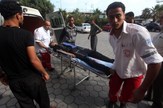
Two Palestinians were injured by Israeli bullets on Saturday after IOF soldiers fired their guns at a group of farmers in Deir al-Ghusun town in Tulkarem.
Media sources in the city said that the wounded were identified as Hatem al-Sharif, 50, and Abdulkarim Atweh, 25.
Medical sources stated that al-Sharif was shot with several bullets in the side of his body. He underwent surgeries in the liver, lungs and diaphragm. He is at ICU in hospital right now due to his critical condition.
Atweh was shot in the hand and received treatment.
Media sources in the city said that the wounded were identified as Hatem al-Sharif, 50, and Abdulkarim Atweh, 25.
Medical sources stated that al-Sharif was shot with several bullets in the side of his body. He underwent surgeries in the liver, lungs and diaphragm. He is at ICU in hospital right now due to his critical condition.
Atweh was shot in the hand and received treatment.
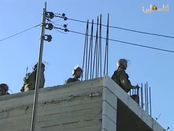
Israeli soldiers invaded, Friday, Silwad town, northwest of Ramallah, attacked Palestinian protesters, and fired dozens of gas bombs on them, causing many residents to suffer the effects of tear gas inhalation, while a young man was mildly injured in his back.
Dozens of soldiers invaded Silwad, assaulted the protesters, before firing dozens of gas bombs on them, and tried to chase them between the houses.
Medical sources said a young Palestinian was shot with a gas bomb, in the back, suffering a mild injury, and was moved to a local hospital.
The soldiers also invaded a number of homes in the town, and occupied their rooftops before using them to fire on the protesters.
Dozens of soldiers invaded Silwad, assaulted the protesters, before firing dozens of gas bombs on them, and tried to chase them between the houses.
Medical sources said a young Palestinian was shot with a gas bomb, in the back, suffering a mild injury, and was moved to a local hospital.
The soldiers also invaded a number of homes in the town, and occupied their rooftops before using them to fire on the protesters.
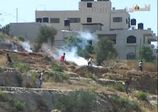
Several residents have been injured, Friday, after Israeli soldiers attacked nonviolent protesters near the Ofer Israeli prison, built on Palestinian lands belonging to Betunia town, west of the Central West Bank city of Ramallah.
The residents were holding their weekly protest, demanding an end to the Israeli occupation of Palestine, and the construction and expansion of illegal colonies in occupied Palestine, in addition to the release of all political prisoners.
The soldiers fired gas bombs and concussion grenades at the protesters, prompting several local youths to hurl stones and empty bottles on them.
The residents were holding their weekly protest, demanding an end to the Israeli occupation of Palestine, and the construction and expansion of illegal colonies in occupied Palestine, in addition to the release of all political prisoners.
The soldiers fired gas bombs and concussion grenades at the protesters, prompting several local youths to hurl stones and empty bottles on them.
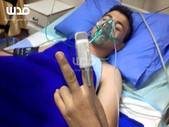
Palestinian medical sources have reported, Friday, the two young men have been shot and moderately injured by live Israeli army fire in Nabi Saleh village, west of the central West Bank city of Ramallah.
The sources said the Omar Tamimi suffered three gunshot injuries, two in his legs, and one in the abdomen, while Ala’ Nakhla was shot, also with a live round, in his right leg, above the knee.
The several Israeli military vehicles invaded the village, and violently attacked the residents, conducting their weekly nonviolent protest against the Annexation Wall and illegal settlements in the village, leading to clashes, Ali Dar Ali of Palestine TV has reported.
The soldiers fired several rounds of live ammunition, gas bombs and concussion grenades at the protesters, and local homes, causing many residents to suffer the effects of tear gas inhalation.
The sources said the Omar Tamimi suffered three gunshot injuries, two in his legs, and one in the abdomen, while Ala’ Nakhla was shot, also with a live round, in his right leg, above the knee.
The several Israeli military vehicles invaded the village, and violently attacked the residents, conducting their weekly nonviolent protest against the Annexation Wall and illegal settlements in the village, leading to clashes, Ali Dar Ali of Palestine TV has reported.
The soldiers fired several rounds of live ammunition, gas bombs and concussion grenades at the protesters, and local homes, causing many residents to suffer the effects of tear gas inhalation.
|
|
Israeli soldiers, accompanied by armored vehicles, including an armored bulldozer, invaded on Friday Kufur Qaddoum village, near the northern West Bank city of Qalqilia, and violently attacked the weekly protest, leading to clashes, and wounding one child in the head.
The protesters marched demanding the army to reopen the village’s main road that has been blockaded for the thirteenth consecutive year. Coordinator of the Popular Committee against the Wall and Settlements in the village Morad Eshteiwy said the soldiers broke into homes and occupied their rooftops, before using them to fire rubber-coated metal bullets, gas bombs and concussion grenades on the protesters. He added that a child, identified as Mohammad Bashar, 13 years of age, |
suffered a head injury, and was moved to the Rafidia Hospital, in the northern West Bank city of Nablus.
Similar to previous invasions, the soldiers deliberately sprayed several homes with wastewater mixed with chemicals, as an act of collective punishment against the villagers, in an attempt to force them to stop their protests and ongoing popular resistance activities.
Eshteiwy demanded international human rights groups to intervene, and put an end to the ongoing and escalating Israeli violations against the village, especially the children who suffer physically and psychologically due to repeated invasions, and deliberate targeting of their homes.
Similar to previous invasions, the soldiers deliberately sprayed several homes with wastewater mixed with chemicals, as an act of collective punishment against the villagers, in an attempt to force them to stop their protests and ongoing popular resistance activities.
Eshteiwy demanded international human rights groups to intervene, and put an end to the ongoing and escalating Israeli violations against the village, especially the children who suffer physically and psychologically due to repeated invasions, and deliberate targeting of their homes.
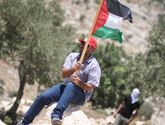
Israeli soldiers attacked, Friday, the weekly nonviolent protest against the Wall and Settlements in Bil’in village, near the central West Bank city of Ramallah.
The Popular Committee against the Wall and Settlements in Bil’in said dozens of Israeli and international peace activists participated in the weekly protest.
It added that as the protesters marched towards the Wall, soldiers fired gas bombs, causing scores to suffer the effects of tear gas inhalation.
It added that several olive trees also caught fire; the trees belong to residents Hashem Bornat, and Shawqi al-Khatib.
The protesters carried Palestinian flags and marched chanting for national unity, the release of all political prisoners and the liberation of Palestine.
This week’s protest also comes also to denounce the murder of Falah Abu Mariya, 53, who was shot and killed, on Thursday at dawn, by Israeli soldiers invading his own home in Beit Ummar town near Hebron, as he tried to help his wounded son, in addition to the fatal shooting of Ahmad Alawna, 19, in Burqin village west of Jenin.
The Popular Committee in Bil’in called on the International Community, local and international human rights groups to act on prosecuting Israel for its ongoing crimes against the Palestinian people, and the repeated violation against their homes, lands and holy sites.
The Popular Committee against the Wall and Settlements in Bil’in said dozens of Israeli and international peace activists participated in the weekly protest.
It added that as the protesters marched towards the Wall, soldiers fired gas bombs, causing scores to suffer the effects of tear gas inhalation.
It added that several olive trees also caught fire; the trees belong to residents Hashem Bornat, and Shawqi al-Khatib.
The protesters carried Palestinian flags and marched chanting for national unity, the release of all political prisoners and the liberation of Palestine.
This week’s protest also comes also to denounce the murder of Falah Abu Mariya, 53, who was shot and killed, on Thursday at dawn, by Israeli soldiers invading his own home in Beit Ummar town near Hebron, as he tried to help his wounded son, in addition to the fatal shooting of Ahmad Alawna, 19, in Burqin village west of Jenin.
The Popular Committee in Bil’in called on the International Community, local and international human rights groups to act on prosecuting Israel for its ongoing crimes against the Palestinian people, and the repeated violation against their homes, lands and holy sites.
